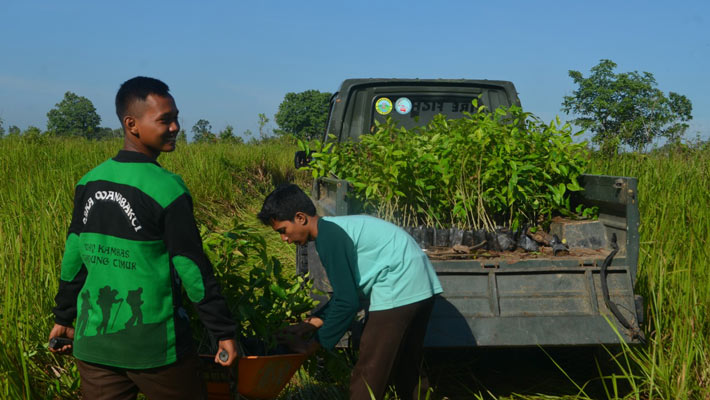Simply protecting remaining habitat is not enough. Degraded habitat must be restored.
Together with Indonesian conservation partners, Taronga is replanting 50 hectares (ha) of critical degraded forest habitat in Sumatra over four years. This year, Taronga has committed to planting a minimum of 15 ha.
Your donation today can:
- $1,000 - plants 500 seedlings
- $5,000 - plants 2,500 seedlings (1ha) and a sign with your name will be placed at the site of planting
- $10,000 - plants 5,000 seedlings (2ha) and a sign with your name will be placed at the site of planting
- $35,000 - plants 50% of required new forest, receives the above recognition, and a giant animal plush of your choice
- We are working together for Habitat, for Wildlife and for Communities and we invite you to be involved
For Habitat
Significant areas of this forest have been highly impacted by human activity. While all illegal agricultural activities in the region have been ceased for over five years, much of the habitat is now a significantly degraded monoculture of elephant grass with opportunity for successful restoration.
This project is the basis for an ambitious long-term radical reforestation project, aiming to replant 5,000 ha (12,355 acres) of forest over the next decade.
For Wildlife
Way Kambas is one of the last strongholds for the critically endangered Sumatran Tiger and Sumatran Rhino and the endangered Sumatran Elephant – species Taronga is committed to protecting.
Experts agree that the only way to save the Sumatran Rhino from extinction in our lifetime is to manage the population in breeding facilities and protection zones like Way Kambas, which has been identified as one of two viable national parks.
For Communities
This work involves and supports local communities, with more than 50 local people employed throughout the duration of the project. Local farmers’ groups are contracted to grow seedlings, and people with disabilities are hired to plant seedlings, trim invasive species and maintain the new growth areas by hand.
Rangers are hired from local communities, to manage the reforestation sites and patrol the areas to prevent poaching.
